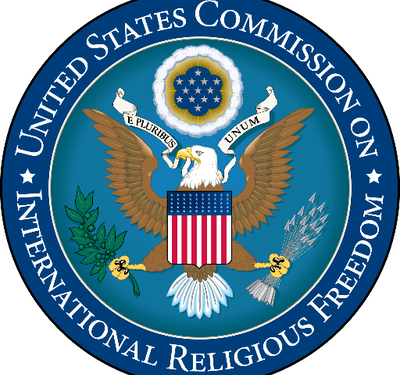The United States Commission for International Religious Freedom (USCIRF) has asked the State Department to designate India in the red list for human rights concerns.
For the third year running, it recommended that India be designated as a “country of particular concern” (CPC) for “engaging in and tolerating systematic, ongoing, and egregious violations of religious freedom, as defined by the International Religious Freedom Act (IRFA)”.
The 2022 report of USCIRF says that, in 2021, religious freedom conditions in India significantly worsened. The report says during the year, the Indian government escalated its promotion and enforcement of policies—including those promoting a Hindu-nationalist agenda—that negatively affect Muslims,Christians, Sikhs, Dalits, and other religious minorities. The government continued to systemise its ideological vision of a Hindu state at both the national and state levels through the use of both existing and new laws and structural changes hostile to the country’s religious minorities, according to the report.
On the last two occasions, the Trump as well as the Biden Administration had declined to go by the USCIRF’s recommendations to designate India as CPC.
The latest report unveiled on Monday has bracketed India with Afghanistan, Burma, China, Eritrea, Iran, Nigeria, North Korea, Pakistan, Russia, Saudi Arabia, Syria, Tajikistan, Turkmenistan and Vietnam.
“In 2021, the Indian government repressed critical voices—especially religious minorities and those reporting on and advocating for them—through harassment, investigation, detention, and prosecution under laws such as the Unlawful Activities Prevention Act (UAPA) and the Sedition Law. The UAPA and Sedition Law have been invoked to create an increasing climate of intimidation and fear in an effort to silence anyone speaking out against the government.”, the report said.
“Father Stan Swamy, an 84-year-old Jesuit priest and longtime human rights defender of Adivasis, Dalits,and other marginalised communities, was arrested on dubious UAPA charges in October 2020 and never tried. He died in custody in July 2021 despite repeated concerns raised about his health.”, according to the report.
The report said that the Indian government arrested, filed complaints against, and launched criminal investigations into journalists and human rights advocates documenting religious persecution and violence, including Khurram Parvez, a prominent Muslim human rights advocate who has reported on abuses in Jammu and Kashmir.
According to the report the government also broadly targeted individuals documenting or sharing information about violence against Muslims, Christians, and other religious minorities; as one example, UAPA complaints were filed against individuals for tweeting about attacks on mosques in Tripura. It says that, in September, the United Nations (UN) High Commissioner for Human Rights stated that the “[o]ngoing use of the [UAPA] throughout India is worrying, with [the Muslim-majority state of] Jammu and Kashmir having among the highest number of cases in the country.”
“The government erected hurdles against the licensure and receipt of international funding by religious and charitable nongovernmental organizations (NGOs) under the Foreign Contribution (Regulation) Act (FCRA), significantly impacting religious communities. Numerous groups that document religious freedom violations or aid marginalised religious communities have been forced to shut down operations in the country given the restrictions under FCRA that regulate access to and reporting on foreign funds and prohibit their receipt for any activities purportedly ‘detrimental to the national interest’.”
The report found that at the close of 2021, the licenses of nearly 6,000 organisations, including religious and humanitarian organisations such as Missionaries of Charity and Oxfam India, were not renewed under the FCRA (after an outcry, Missionaries of Charity’s license was renewed in January 2022).
“Government action, including the continued enforcement of anti-conversion laws against non-Hindus, has created a culture of impunity for nationwide campaigns of threats and violence by mobs and vigilante groups, including against Muslims and Christians accused of conversion activities. Anti-conversion laws have increasingly focused on interfaith relationships. Existing laws in approximately one-third of India’s 28 states limit or prohibit religious conversion. Since 2018 (and continuing in 2021), multiple states have introduced and enacted laws or revised existing anti-conversion laws to target and/or criminalise interfaith marriages. Public notice requirements for interfaith marriages have at times facilitated violent reprisals against couples. Authorities also assisted, if not encouraged, the targeting by non-state actors of interfaith couples, converts, their families, and their religious communities in an effort to prevent interfaith marriages.”, the USCIRF report says.
“National, state, and local governments demonised and attacked the conversion of Hindus to Christianity or Islam. In October 2021, Karnataka’s government ordered a survey of churches and priests in the state and authorised police to conduct a door-to-door inspection to find Hindus who have converted to Christianity. In June 2021, Yogi Adityanath, chief minister of Uttar Pradesh, warned that he would invoke the National Security Act, which allows for the detention of anyone acting in any manner that threatens the security of state, and that he would also deploy a team of over 500 officials to counter those (including, by his account, children) who were carrying out conversion activities.”, according to the report.
USCIRF urged the US State Department to raise religious freedom issues in the US-India bilateral relationship and highlight concerns through hearings, briefings and letters.
Follow NRI Affairs on Facebook and Twitter for latest updates. Support us on Patreon.











